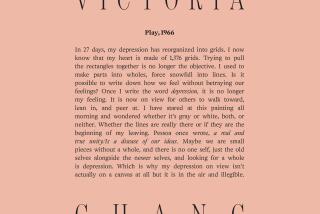Death awaits
THIS novel doesn’t have much of a plot, it’s disconnected in a consciously Modernist way, and yet it grabs the reader immediately. We hardly know the four protagonists, but they come to life and stick in the mind. And then there’s the writing -- beautiful, evocative, deeply moving:
“Late that night it began to rain: a cleansing downpour that fell with a steady roar from the burst clouds. Sid didn’t hear the rain. In his sleep he sensed the unexpected coolness stealing into the room and spreading out like a cold compress over the baking walls. He felt an airy sprite approach and stroke his forehead. He didn’t hear the mynah bird frantically beating its wings inside its cage. He didn’t hear the shutters banging, or the rush of water in the storm drains. It rained and rained. The city flushed itself out.”
The fifth novel by distinguished Greek writer Ersi Sotiropoulos, “Zigzag Through the Bitter-Orange Trees” has been brilliantly translated by a distinguished American professor emeritus of classics. Modern Greek is quite different from its antecedent, but clearly Peter Green has an affinity for the contemporary language. The translation pulsates with vigor and is full of nuance. Sotiropoulos played a considerable part, Green writes, in transforming her “highly idiomatic Greek” into equally colloquial English prose. The reader is always lucky when there is this kind of input from the author -- think of Isaac Bashevis Singer’s role in translating his work from Yiddish into marvelous English after decades in America.
“Zigzag Through the Bitter-Orange Trees” presents its particular Athens approaching the millennium through the eyes of Lia, a young woman dying of a mysterious disease in a hospital very different from a modern American one; her ne’er-do-well brother Sid; her nurse Sotiris; and a rebellious 12-year-old girl, Nina. Lia is the heart of the novel, by far the most arresting. It’s not just the poignancy of a brave young woman facing her premature death, it’s the quality of her insights that sets her apart:
“Physical decay starts in an odd fashion. With no warning. The way Scandinavians get drunk. One minute they’re talking to you quite normally, the next they’re throwing up on you. The way your body quits is much the same. One day you’re fine -- well, more or less fine. The next, one after another your organs begin to go on the blink.... A familiar noise reaches you, muffled in cottonwool and transformed into something terrifying. The ticking of a clock grows thick in the air, dominating the entire room.”
Two things mar this admirable novel. One is an occasional coarseness that intrudes into this otherwise sensitive piece of work: Need there be quite so much of spitting contests and need they be described quite so disgustingly? The other is the footnotes explaining cultural and mythological references. (Some of us really do know what hydra-headed means.) Despite these flaws, “Zigzag” is a delightful read.
More to Read
Sign up for our Book Club newsletter
Get the latest news, events and more from the Los Angeles Times Book Club, and help us get L.A. reading and talking.
You may occasionally receive promotional content from the Los Angeles Times.







